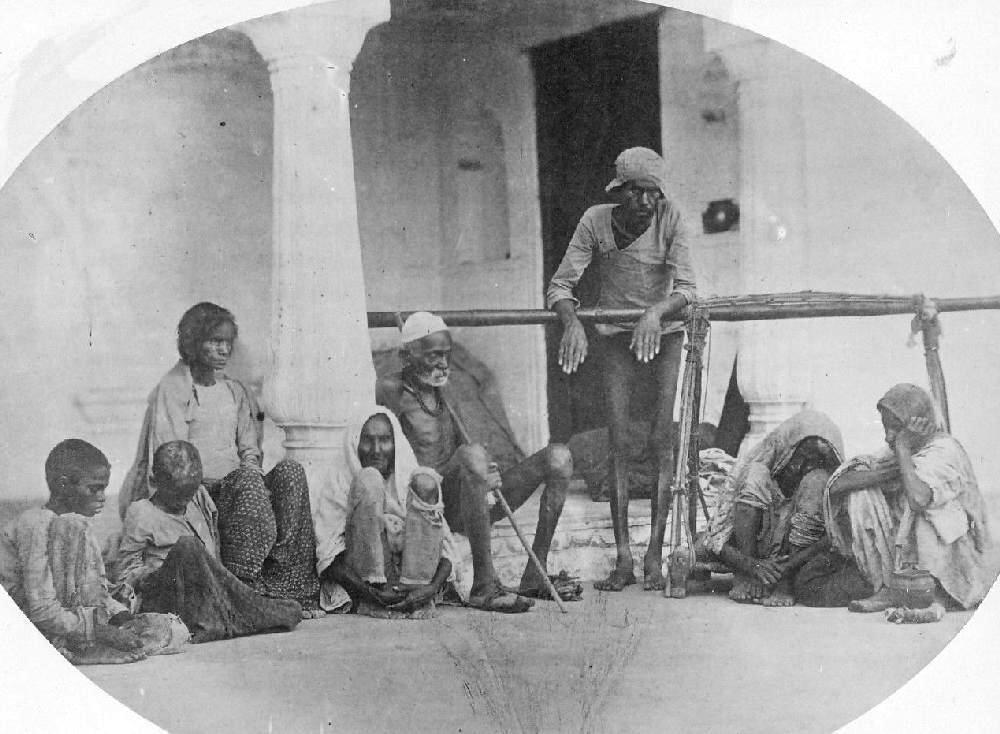
The British Raj: Accomplishments and Failures

Figure 1.--Here we see poor Indians suffering from famine, apparently in the 1870s. The phoograph was taken near Delhi. The justification for the raj was ghat Indians would benefits from a nodern effcent adminisration. British officils, however, did a terrible job of deling with a seies of deadly famines. Source: The People of India.'
|
|
Assesing the British Raj is difficult because colonialism is an emotive issue. There were substantial accomolishments as well as failures during the Raj. India's modern infrastructure was built during the Raj. Britain founded a modern education system and laid the foundation for a democratic system, a rare development in the Third World. Britain began to move toward home rule in India, perhaps inadequate, but certainly a movemnent in the right direction. The steps toward home rule were vital in the sucessful development of democeacy in India, if not in Pakistan,The British persued a basically free trade policy. Indians were able to trade with other countries. And Indians were able to do business and advance economically. Britain set polieces to benefit Britain and not India. But many Indians took advantage of the stable political situation. While British policies undercut local industries. Notably, most of the serious problems India now faces date from either centuries old traditions or socialist policies adopted by India after independence and not the Raj. The public health measures taken significatly reduced the deathbrate and was a factor in populartion growth. There was complete religious freedom. The establishment of the rule of law, albeit imperfect had positive influences in both the evelopment of the Indian legal system and laying the ground work toward capitalism. There were also notable failures. Threis no doubt that the Raj fale to live up to its promised objectives. Serious famines were not well handled. Part of the British justification for the Raj was a modern, efficent governmental administration. But the Raj failed in the important responsibility to deal with famine. Famine did not end wuth British control. One can argue that famine is endemic in India. But one thing is indisputable, the Raj fid not deal efficintely or humanely with famine. It may have even created circumstances making famines more serious. Many Indian peasants lost their land. The greatest Brutish failure was the Bengal Fmine durung World War II. In fairness to be the Bitish, Congress' Quit India policy put the colonial administration under great pressue, but the Famine was a failure of British administration along the line of the Irih Potato Famine. Racism was a part of the Raj. In fairness to the British, however, racism wa endemic among Indians before and after the British arrived. It was a part of Hindu theology. And there were abuses, the most notable being the Jallianwala Bagh or Amritsar massacre was the most notable event (1919). British troops killed some 400-1,000 peaceful protestors. While small on the list of 20th century atrocities, it proved to be a seminal event in the history of the Raj. Perhaps the greatest gift to India was defeating the inanely racist Axis powers, NAZI Germany and Imperial Japan. The Japanese reached the borders of India. Indians but not Congress played an important roke in the British war effort. These are all very imporatant achievments. As to the impact of the Rj on modern India. India did not make the progress widely expected by India after independnce. If the independent Indians chose socialism and govrnment planning until the market reforms of the 1990s, that cannot be blamed on the British.
CIH

Navigate the Children in History Website:
[About Us]
[Introduction]
[Animals]
[Biographies]
[Chronology]
[Climatology]
[Clothing]
[Disease and Health]
[Economics]
[Ethnicity]
[Geography]
[History]
[Human Nature]
[Law]
[Nationalism]
[Presidents]
[Religion]
[Royalty]
[Science]
[Social Class]
[Bibliographies]
[Contributions]
[FAQs]
[Glossaries]
[Images]
[Links]
[Registration]
[Tools]
[Children in History Home]
Navigate the Boys' Historical Clothing national pages:
[Return to the Main British Raj page]
[Return to the Main Indian history British period]
[Return to the Main Indian history page]
[Return to the Main Pakistani history page]
[Return to the Main countries page]
[Australia]
[Banladesh]
[Burma]
[China]
[India]
[Indonesia]
[Japan]
[Korea]
[Malaysia]
[Nepal]
[Pakistan]
[Sri Lanka]
[England]
Created: 9:12 AM 5/17/2017
Last updated: 9:12 AM 5/17/2017



